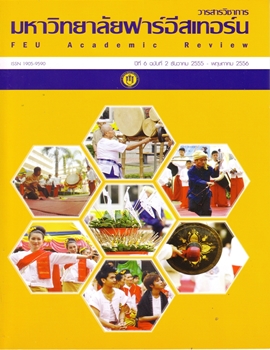พฤติกรรมการบริโภคและปัจจัยที่มีผลต่อการบริโภคผลิตภัณฑ์ “แบรนด์” ของนักเรียนมัธยมศึกษาตอนปลายในโรงเรียนกวดวิชาเขตปทุมวัน กรุงเทพมหานคร
Main Article Content
Abstract
การศึกษาเรื่องพฤติกรรมการบริโภคและปัจจัยที่มีผลต่อการบริโภคผลิตภัณฑ์ “แบรนด์” ของนักเรียนมัธยมศึกษาตอนปลายในโรงเรียนกวดวิชาเขตปทุมวัน กรุงเทพมหานคร มีวัตถุประสงค์ 2 ประการคือ 1) เพื่อศึกษาพฤติกรรมการบริโภคผลิตภัณฑ์ “แบรนด์” ของนักเรียนมัธยมศึกษาตอนปลายในโรงเรียนกวดวิชาเขตปทุมวัน กรุงเทพมหานคร 2) เพื่อศึกษาปัจจัยส่วนบุคคล ปัจจัยทางการตลาด ปัจจัยด้านสังคมและวัฒนธรรม ที่มีอิทธิพลต่อพฤติกรรมการบริโภคผลิตภัณฑ์ "แบรนด์" ของนักเรียนมัธยมศึกษาตอนปลายในโรงเรียนกวดวิชาเขตปทุมวัน กรุงเทพมหานคร
กลุ่มประชากรที่ใช้ในการวิจัย คือ นักเรียนมัธยมศึกษาตอนปลายที่กำลังศึกษาอยู่ในโรงเรียนกวดวิชาเขตปทุมวัน ซึ่งเคยบริโภคหรือกำลังบริโภคผลิตภัณฑ์ “แบรนด์” ขนาดกลุ่มตัวอย่างในการวิจัย มีจำนวน 405 คน ใช้การสุ่มตัวอย่างแบบสะดวกหรือแบบบังเอิญ เครื่องมือที่ใช้ในการเก็บรวบรวมข้อมูล คือ แบบสอบถาม /สถิติที่ใช้ในการวิเคราะห์ข้อมูล ได้แก่ ร้อยละ ค่าเฉลี่ย ค่าส่วนเบี่ยงเบนมาตรฐาน และทดสอบสมมติฐานด้วยการวิเคราะห์หาความสัมพันธ์แบบไคสแควร์ (Chi-Square) ผลการวิจัย พบว่า ในด้านพฤติกรรมการบริโภคผลิตภัณฑ์ “แบรนด์” ของนักเรียนมัธยมศึกษาตอนปลายในโรงเรียนกวดวิชาเขตปทุมวัน กรุงเทพมหานคร ผู้บริโภคส่วนใหญ่มีประสบการณ์บริโภคผลิตภัณฑ์ “แบรนด์” น้อยครั้ง (3-5 ครั้ง) มีค่าใช้จ่ายที่ซื้อผลิตภัณฑ์แต่ละครั้งน้อยกว่า 100 บาท ส่วนใหญ่รับประทานผลิตภัณฑ์แบรนด์ซุปไก่สกัดชนิดน้ำสูตรต้นตำรับ มีความถี่ในการซื้อผลิตภัณฑ์มากกว่า 1 เดือน/ครั้ง และเหตุผลสำคัญที่รับประทาน คือ เพื่อบำรุงร่างกายและสมอง บุคคลในครอบครัวมีส่วนช่วยให้คำปรึกษาและช่วยตัดสินใจซื้อผลิตภัณฑ์มากที่สุด สำหรับช่วงเวลาที่รับประทานผลิตภัณฑ์คือ ช่วงใกล้สอบ โดยซื้อผลิตภัณฑ์จากร้านค้าสะดวกซื้อ/เซเว่น อีเลฟเว่น และสื่อที่ได้รับข้อมูลเกี่ยวกับผลิตภัณฑ์มากที่สุด คือ สื่อทางโทรทัศน์ ในการทดสอบหาความสัมพันธ์ระหว่างปัจจัยส่วนบุคคล ปัจจัยทางการตลาด ปัจจัยด้านสังคมและวัฒนธรรมกับพฤติกรรมการบริโภคผลิตภัณฑ์ “แบรนด์” พบว่า ผู้บริโภคที่มีเพศ และรายได้เฉลี่ยต่อเดือนแตกต่างกัน มีพฤติกรรมการบริโภคผลิตภัณฑ์ “แบรนด์” แตกต่างกัน ส่วนปัจจัยทางการตลาด พบว่า ด้านผลิตภัณฑ์ ด้านการส่งเสริมตลาด มีความสัมพันธ์กับพฤติกรรมการบริโภคผลิตภัณฑ์ “แบรนด์” อย่างมีนัยสำคัญทางสถิติที่ระดับ .05 ส่วนปัจจัยด้านสังคมและวัฒนธรรม พบว่า ด้านสังคม (กลุ่มอ้างอิง) และด้านวัฒนธรรม(วัฒนธรรม,ชั้นสังคม) มีความสัมพันธ์กับพฤติกรรมการบริโภคผลิตภัณฑ์ “แบรนด์” อย่างมีนัยสำคัญทางสถิติที่ระดับ .05
This research study had two objectives. The first objective is to study the consumer behaviors of the consuming of Brand product of high school students in Special Tutorial Schools in Pratumwan District. The second objective is to study the influential factors including personal, marketing, and social and cultural factors that affect the consuming behavior of Brand product of high school students in Special Tutorial Schools in Pratumwan District.
The sampling group was selected from 405 high school students in Special Tutorial Schools in Pratumwan District who had drunk the Brand product. The questionnaire was used to collect data. The data was analyzed using percentage, mean, standard deviation, and Chi-Square.
The results showed that most high school students had a few experience in consuming the Brand product (3-5 times) and spent less than 100 Baht for each purchase. Most students consumed the traditional flavor. They purchased more than once a month. The main reason to consume Brand product was for health and brain. The influential persons who advice and encourage students to buy the products were family members. They usually bought during the examination period though the convenience stores. The most important media was T.V advertising. The analysis of personal background, marketing factors, and social and cultural factors showed that gender and monthly income affected the Brand product’s consumption behavior. The marketing mixes on product and promotion related to the consumption behavior of Brand product at 0.05 significant level. Social and cultural factors related to the consumption behavior of Brand product at significant level of 0.05.
Article Details
1. Any views and comments in the Journal of Social Innovation and Lifelong Learning are the authors’ views. The editorial staff have not to agree with those views and it is not considered as the editorial’s responsibility.
2. The responsibility of content and draft check of each article belongs to each author. In case, there is any lawsuit about copyright infringement. It is considered as the authors’ sole responsibility.
3. The article copyright belonging to the authors and The Far Eastern University are copyrighted legally. Republication must be received direct permission from the authors and The Far Eastern University in written form.

